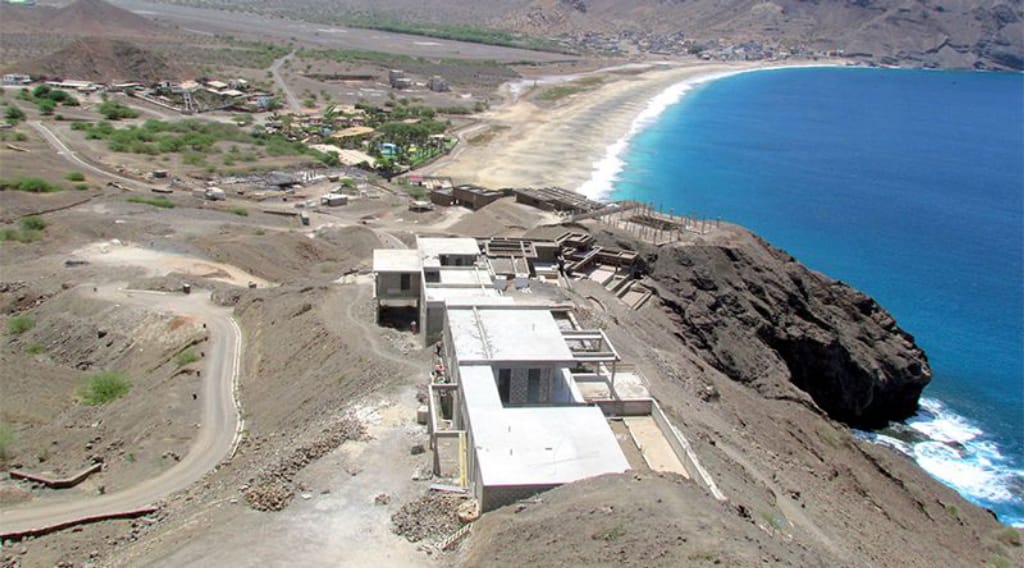

Cape Verde has been consolidating itself as an example of digital transformation in Africa, standing out for its strategic vision and investments in technology. The recent inauguration of TechPark CV, a landmark infrastructure supported by the African Development Bank, symbolises the country's commitment to positioning itself as a technological hub of excellence in the West African region. This technology park, which already hosts companies from seven countries and employs hundreds of young people, reinforces Cape Verde's ambition to attract talent and promote the export of digital services. For more details on this milestone, see e-Global.
Cape Verde's Digital Strategy, part of the Strategic Plan for Sustainable Development, aims to transform the archipelago into an international platform for digital services. This plan benefits from the country's privileged geographical location, political and social stability, and growing digital connectivity. In addition, initiatives such as the Cabo Verde Digital programme have fostered technological entrepreneurship and innovation, creating an ecosystem favourable to the growth of start-ups. Find out more about the digital strategy on the Ministry of Digital Economy.
Despite this progress, the country faces significant challenges. The need to modernise infrastructure, overcome logistical limitations and compete with more established technological hubs are barriers that require innovative solutions and strategic partnerships. However, the potential is vast, with opportunities in areas such as artificial intelligence, cybersecurity and fintechs, which can boost the economy and attract international investment. For a detailed analysis of market opportunities, see the S&D Consultancy.
This report explores the opportunities and challenges that Cape Verde faces in its digital transformation journey, highlighting the initiatives underway, the areas of greatest potential and the strategies needed to consolidate the country as a leader in technological innovation in West Africa.
Contents
Digital connectivity is one of the fundamental pillars for the success of Cape Verde's Digital Strategy. The country has invested significantly in the expansion of telecommunications infrastructure, most notably the installation of submarine cables that improve bandwidth and international connectivity. These investments are crucial for reducing dependence on limited external connections and for positioning Cape Verde as a digital hub in West Africa. According to Ministry of Digital EconomyOne of the projects underway is the implementation of a new submarine cable linking the archipelago to Europe and South America, increasing data transmission capacity and reducing associated costs.
In addition, the expansion of fibre optic networks throughout the country has been a priority. This effort aims to ensure that both urban and rural areas have access to high-speed internet, promoting digital inclusion. The government's goal is to achieve coverage of 90% of the population with high-speed internet by 2030, an ambitious target that requires public-private partnerships and international funding.
One of the most promising initiatives in the development of technological infrastructure in Cape Verde is the creation of the Special Economic Technology Zones (ZEET). These zones are designed to attract foreign investment, foster innovation and create a robust technological ecosystem. According to World BankThe ZEETs include modern infrastructures such as data centres, innovation hubs and coworking spaces, which facilitate collaboration between start-ups, established companies and academic institutions.
These zones also offer tax and regulatory incentives for technology companies, making Cape Verde an attractive destination for international investors. The country's strategic location on the Atlantic is an additional factor that reinforces the potential of the ZEETs as export platforms for digital services to African, European and American markets.
The modernisation of public services through digitalisation is another essential component of Cape Verde's digital strategy. The government has set itself the target of digitising 60% of public services by 2026 and 80% by 2030, according to the Ministry of Digital Economy. This transformation includes the implementation of electronic document issuing platforms, digital health management systems and online administrative service portals.
A concrete example is the "Sikabadu" programme, which aims to facilitate access to public services for citizens and companies by reducing bureaucracy and increasing efficiency. This programme has already resulted in a reduction of 85% in the time taken to issue electronic documents, as reported by the World Bank.
Training a qualified workforce is indispensable for the success of any digital strategy. Cape Verde has invested in technological education programmes, such as "Weblabs", which has already trained around 14,000 students in areas such as web development, robotics and digital marketing. These efforts are complemented by partnerships with international institutions to offer advanced courses in artificial intelligence, blockchain and other emerging technologies.
In addition, the government is working on setting up technology training centres on all the islands, with the aim of decentralising access to education and promoting social inclusion. These centres are equipped with modern laboratories and high-speed connectivity, allowing students to acquire practical skills in advanced learning environments.
The success of Cape Verde's Digital Strategy depends largely on strategic partnerships and access to international funding. The World Bank, for example, is co-financing the implementation of the strategy with an investment of 20 million dollars, spread over four main pillars: digital ecosystem reforms, digital competitiveness, Cape Verde as a digital platform and project management. (Ministry of Digital Economy).
In addition, Cape Verde has established collaborations with global technology companies to transfer knowledge and technology. These partnerships include the implementation of artificial intelligence solutions for the management of public services and the development of e-commerce platforms to support small and medium-sized local businesses.
Creating a secure regulatory environment and promoting sustainable practices are also priorities for attracting foreign investment. These measures include the adoption of data protection regulations in line with international standards, such as the European Union's General Data Protection Regulation (GDPR), and the promotion of renewable energies in technological infrastructures, reducing the digital sector's carbon footprint.
Technological innovation in Cape Verde has brought about a significant transformation in the business landscape, allowing new business models to emerge. The integration of technologies such as artificial intelligence (AI), big data and e-commerce platforms has enabled local companies to overcome geographical limitations, expanding their reach to international markets. For example, Cape Verdean companies have been using digital platforms to sell artisanal and cultural products to consumers in Europe and North America, taking advantage of the growing demand for authentic and sustainable products.
In addition, digitalisation is enabling the creation of service-based businesses, such as digital consultancies and software solutions, which were previously unviable due to a lack of suitable technological infrastructure. This phenomenon is particularly relevant for startups, which can now operate with reduced start-up costs and reach a global audience. (consultancy.cv)
In the agricultural sector, technological innovation has played a crucial role in modernising and increasing the efficiency of operations. The implementation of sensor monitoring systems, drones for land mapping and AI-based solutions for crop forecasting is transforming agriculture in Cape Verde. These technologies allow farmers to optimise the use of resources such as water and fertilisers, reducing costs and minimising environmental impact.
For example, local startups have developed mobile applications that provide real-time information on weather conditions and recommendations for sustainable agricultural practices. These innovations not only increase productivity, but also help mitigate the effects of climate change, a significant challenge for the archipelago. (mindelinsite.com)
The financial sector in Cape Verde has been revolutionised by the introduction of financial technologies (fintech), which are promoting financial inclusion and facilitating access to banking services for previously excluded populations. Solutions such as digital wallets, mobile payment systems and microfinance platforms have enabled small entrepreneurs and informal workers to access capital and manage their finances more efficiently.
These technologies are particularly important in rural areas, where access to traditional banks is limited. For example, mobile payment platforms such as M-Pesa, adapted to the Cape Verdean context, have facilitated fast and secure financial transactions, promoting local economic growth. (oportoforteafrica.com)
Technological innovation has also had a positive impact on the education sector, creating opportunities for digital training and the development of relevant skills for the labour market. E-learning platforms and online courses have enabled young entrepreneurs to acquire knowledge in areas such as programming, digital marketing and business management, often at low cost.
In addition, government initiatives and partnerships with international institutions have promoted training programmes in advanced digital skills, such as data analysis and software development. These actions are essential to prepare the Cape Verdean workforce to compete in an increasingly digitalised global market. (consultancy.cv)
Technological innovation has been a driving force behind the development of sustainable solutions in Cape Verde, particularly in the renewable energy sector. Local startups are exploring solar and wind technologies to create clean energy solutions that can be implemented in remote communities. These initiatives not only help to reduce dependence on fossil fuels, but also create new business opportunities in the energy sector.
For example, solar energy micro-generation systems have been adopted by small businesses to reduce operating costs and increase energy efficiency. In addition, the use of advanced storage batteries allows for more effective energy management, guaranteeing a stable supply even in areas with limited infrastructure. (expressodasilhas.cv)
One of the main challenges facing Cape Verde in terms of digital transformation is digital inclusion, particularly in rural and remote areas. Although the country has invested in fibre optic submarine cables to improve connectivity, there are still significant inequalities in internet access between the islands. According to World BankAt the same time, around 30% of the population still does not have reliable access to the internet, which limits full participation in the digital economy.
To mitigate this problem, the Cape Verdean government has implemented initiatives such as the "Cabo Verde Digital" programme, which aims to expand connectivity and promote digital inclusion. This programme includes the installation of free Wi-Fi hotspots in public areas and the creation of digital community centres to train citizens in basic technological skills. In addition, partnerships with international organisations have enabled the implementation of low-cost solutions, such as satellite internet networks, to reach isolated communities.
Another significant obstacle is the lack of advanced digital skills in the Cape Verdean workforce. Although there are technological training initiatives, such as the "Weblabs" programme, which has already trained thousands of young people in areas such as robotics and web development, there is still a considerable gap in specialised skills, such as artificial intelligence, blockchain and data analysis. This gap limits the country's ability to attract investment in cutting-edge technology sectors and compete in global markets.
To meet this challenge, the government and the private sector have collaborated on vocational training and higher education programmes. For example Ministry of Digital Economy recently launched an initiative to integrate emerging technology courses into the curricula of local universities. In addition, partnerships with global technology companies have facilitated the transfer of knowledge and the creation of internship programmes for young talent.
Interoperability between systems and data security are critical challenges for the effective implementation of digital services in Cape Verde. The fragmentation of existing systems makes it difficult to integrate and share information between different government departments, resulting in inefficiencies and redundancies. In addition, the lack of a robust cybersecurity infrastructure exposes digital services to the risk of cyber attacks, jeopardising the trust of citizens and investors.
To address these issues, the Action Plan for Cape Verde's Digital Governance Strategy (PA-EGDCV) includes specific measures to improve interoperability and data security. These measures include the creation of a centralised platform for government data management and the implementation of cyber security standards in line with international standards. The "Sikabadu" programme, mentioned in the World Bankis an example of success in reducing redundancies and increasing efficiency by digitising public services.
Resistance to change and cultural adaptation represent less tangible but equally important challenges in the digital transformation. Many citizens and civil servants still prefer manual processes due to a lack of familiarity with digital technologies or the perception that they are less reliable. This resistance is often exacerbated by a lack of effective communication about the benefits of digitalisation.
To overcome this barrier, the government has invested in awareness campaigns and training programmes to promote the uptake of digital technologies. For example, initiatives such as "eParticipa" (eParticipate) have been used to educate citizens about the benefits of digital services and to encourage their use. In addition, workshops and seminars have been organised to train civil servants in the use of new digital tools, ensuring a smoother transition to modernised systems.
Financial sustainability is another significant challenge in Cape Verde's digital transformation. The high cost of implementing technological infrastructure and maintaining digital systems represents a considerable financial burden for a country with limited resources. Although the World Bank and other international organisations have provided substantial funding, such as the 20 million dollars mentioned in the Ministry of Digital EconomyThe dependence on external financing may not be sustainable in the long term.
To address this issue, the government is exploring alternative financing models, such as public-private partnerships (PPPs) and tax incentives to attract private sector investment. In addition, the creation of Special Economic Zones for Technologies (ZEET) has been an effective strategy for generating additional revenue and attracting international technology companies, as highlighted in the World Bank.
The study on technological innovation in Cape Verde shows significant advances in the country's digital transformation, driven by strategic investments in infrastructure, education and international partnerships. The expansion of connectivity, through submarine cables and fibre optic networks, has been crucial in positioning the archipelago as a digital hub in West Africa, while initiatives such as the Special Technology Economic Zones (World Bank) are attracting foreign investment and fostering innovation. At the same time, the modernisation of public services and technological training programmes such as "Weblabs" have promoted digital inclusion and strengthened the local workforce.
Despite this progress, challenges remain, such as unequal internet access, a shortage of advanced digital skills and the need for greater interoperability and data security. The government has implemented solutions such as the "Digital Cape Verde" programme and the action plan for digital governance (eParticipate), but financial sustainability and cultural resistance to change still require attention. Betting on public-private partnerships, tax incentives and the promotion of sustainable practices, such as the use of renewable energies, are fundamental steps to consolidate the progress made.
In short, Cape Verde is demonstrating a solid commitment to digital transformation, positioning itself as an emerging model of technological innovation in the region. However, to maximise the impact of these initiatives, it will be essential to continue investing in digital inclusion, specialised training and financial sustainability, ensuring that the benefits of digitalisation are widely shared by society.







